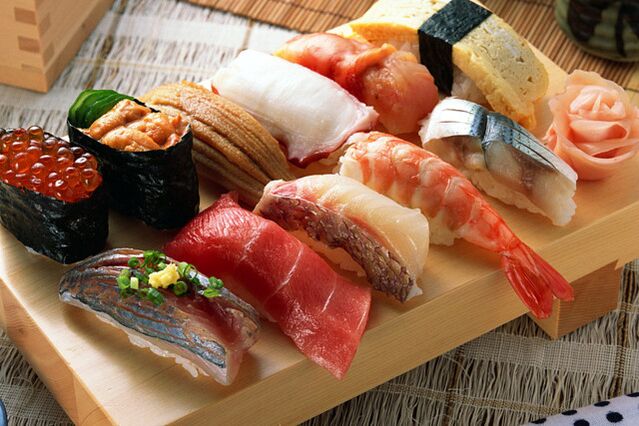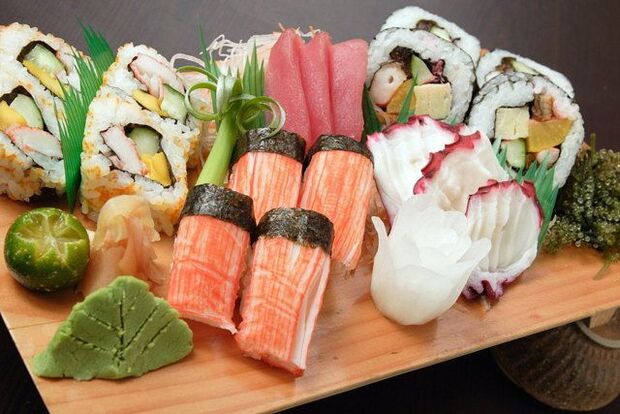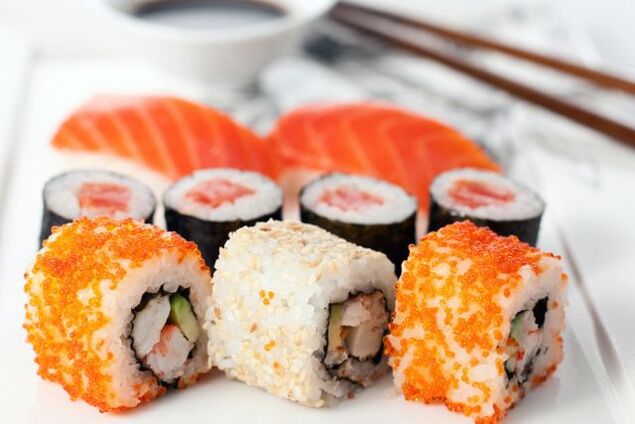
The Japanese diet is considered one of the most effective and popular modern diets.
Why? Because in a fairly short period of time - 14 days - you can get rid of 7-11 extra kilos.
Such a quick effect is explained by the fact that the Japanese diet is not balanced, that is, it is compiled without taking into account the proportions of fats, proteins and carbohydrates. In addition, the Japanese diet menu is quite low in calories due to the low carbohydrate content that it contains, which makes the body work to burn its own layer of fat.
The main goal of the Japanese diet is to change the rhythm of metabolic processes in the body, which subsequently allows you to maximize the effect of losing weight for 2-3 years.
The essence of the Japanese diet
The essence of the Japanese diet is food with a higher amount of protein, which is supplied by foods allowed in the diet: meat, fish, dairy products.
The Japanese diet is considered quite rigid due to the strict restrictions on the menu. During the Japanese diet, you can not eat:
- Salt;
- condiments;
- sugar and confectionery;
- alcohol.
However, if you are used to drinking only coffee for breakfast, and prefer meat and fish for lunch, the Japanese diet will not seem so difficult. Also, one of the advantages of this diet is the fermented milk products, fruits and vegetables allowed in the diet.
Fluid intake during the Japanese diet is not limited: you can drink as much as you want during the day, but not less than 1. 5 liters per day. You can drink mineral water, tea or just plain water.
There are several menu options for the Japanese diet for 14 days, which do not differ much from each other in the composition of the products. But if you have chosen one option, then you should not "jump" to another if the first one suddenly does not suit you for some reason.
Japanese diet menu for 14 days.

Strictly observe the menu indicated in the following table:
| Breakfast | Dinner | Dinner | |
|---|---|---|---|
| Day 1 | a cup of coffee | 2 boiled eggs, coleslaw with vegetable oil, a glass of tomato juice. | boiled or fried fish (200 grams) |
| Day 2 | coffee, 1 cookie (cookies) | 100 grams of boiled or fried fish, coleslaw (with vegetable oil). | boiled beef (100 grams), a glass of kefir. |
| Day 3 | coffee, cookie (cookies) | fried zucchini (200 grams) | 2 boiled eggs, 200 grams of boiled beef, coleslaw. |
| Day 4 | coffee | raw egg, 3 grated raw carrots with vegetable oil, 20 grams of Parmesan | Fruit |
| Day 5 | grated carrots seasoned with lemon. | boiled or fried fish (200 grams), a glass of tomato juice | Fruit |
| day 6 | a cup of coffee | ½ salad of chicken, carrot and boiled cabbage | 2 hard-boiled eggs, grated carrots seasoned with vegetable oil |
| day 7 | Green Tea | boiled beef (200 grams), fruit | any dinner from the previous days (except the third! ) |
| day 8 | Green Tea | ½ salad of chicken, carrot and boiled cabbage | 2 boiled eggs, coleslaw and carrot |
| day 9 | coffee | 200 grams of boiled or fried fish, a glass of tomato juice | any fruit |
| day 10 | coffee | 1 egg (raw), 3 grated carrots with vegetable oil, 20 grams of Parmesan | Fruit |
| day 11 | coffee, 2 sugar free cookies | courgettes fried in vegetable oil (200 grams) | 2 eggs (hard-boiled), 200 grams of boiled beef, coleslaw |
| day 12 | coffee (2 dry biscuits) | boiled or fried fish (200 grams), carrot or cabbage salad | 200 grams of boiled beef, a glass of kefir |
| day 13 | coffee | 2 boiled eggs, coleslaw with carrots, 1 glass of tomato juice | boiled or fried fish (200 grams) |
| day 14 | coffee | fried or boiled fish (200 grams), coleslaw with carrots | 200 grams of boiled beef, a glass of kefir |
Japanese diet plan and rules.

1. See a doctor
- First of all, the Japanese diet provides for the constant consumption of black coffee, which may be contraindicated for people with cardiovascular diseases, hypotension and hypertension. Your doctor may recommend replacing black coffee with green tea.
- Secondly, a large amount of protein causes a load on the kidneys, which can cause weakness and loss of strength, headaches, and an acetone taste in the mouth.
The Japanese diet is contraindicated:
- nursing mothers and children;
- during physical exertion and hard work.
2. Preparation for a diet
Directly before the diet, it is necessary to organize a fasting day: instead of breakfast and lunch, it is recommended to drink 2-3 glasses of kefir or milk, for dinner - a small portion of buckwheat or rice and a salad of fresh vegetables. .
3. Foods during the diet
- The coffee used during the diet must be natural, since it contains antioxidants that help the body.
- It is recommended to cook meat and fish in a water bath or fry in a small amount of oil.
- Olive oil is recommended for dressing vegetable salads.
4. Vitamins
A low-calorie diet is not able to provide the body with the necessary substances, therefore it is imperative to take a complex of vitamins and minerals at the moment.
5. Salt from the diet
You can not organize a "stomach vacation" on the way out of the diet and pounce on food.
The calorie content of the diet should be increased gradually: you need to add salt to food little by little, eat starches and sweets in moderation.
The main rules of the Japanese diet:
- Accurately observe the diet by day, do not confuse the sequence of days.
- Use only the products listed on the menu.
- Drink 1. 5 liters of fluid a day.
- Do not continue the diet for more than 14 days.
Japanese diet reviews for 14 days.
1. Physician reviews.
The Japanese diet is considered very harsh, so first of all it is necessary to have a psychological attitude to avoid nervous breakdowns during the diet. The body receives stress due to low-calorie foods, and therefore temporary metabolic disorders and "food spoilage" are possible.
2. Other reviews
First review: From my own experience I want to say that the Japanese diet is very difficult to bear. Especially in the first days. But the result is minus 9 kg. And 4 months have passed and the weight has not returned, however, I keep fit with the help of fitness.
Second review: The hardest first 4 days. There were even dizziness. But the result was 100% worth it. Less 10 kilos! Yes, and the body is well cleansed during this time.
Third review: Of the benefits: delicious products, no need to choke on kefir or buckwheat. Of the minuses: weakness in the first days, feeling of hunger. The result is minus 7 kilos.
As you can see, the effectiveness of the diet is confirmed in practice, however, starting a diet, the main thing is to gather all your will into one fist and try not to let go.






















